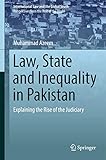Law, State and Inequality in Pakistan [electronic resource] : Explaining the Rise of the Judiciary / by Muhammad Azeem.
Material type: TextSeries: International Law and the Global South, Perspectives from the Rest of the WorldPublisher: Singapore : Springer Singapore : Imprint: Springer, 2017Description: XVIII, 278 p. online resourceContent type: text Media type: computer Carrier type: online resourceISBN: 9789811038457Subject(s): Law | Political economy | Asia -- Politics and government | International organization | International law | Law | Sources and Subjects of International Law, International Organizations | International Organization | Political Economy | Legislative and Executive Politics | Asian PoliticsAdditional physical formats: Printed edition:: No titleDDC classification: 341 LOC classification: K3150Online resources: e-book Full-text access
TextSeries: International Law and the Global South, Perspectives from the Rest of the WorldPublisher: Singapore : Springer Singapore : Imprint: Springer, 2017Description: XVIII, 278 p. online resourceContent type: text Media type: computer Carrier type: online resourceISBN: 9789811038457Subject(s): Law | Political economy | Asia -- Politics and government | International organization | International law | Law | Sources and Subjects of International Law, International Organizations | International Organization | Political Economy | Legislative and Executive Politics | Asian PoliticsAdditional physical formats: Printed edition:: No titleDDC classification: 341 LOC classification: K3150Online resources: e-book Full-text access | Item type | Current library | Collection | Call number | Copy number | Status | Notes | Date due | Barcode |
|---|---|---|---|---|---|---|---|---|
| E-Books | MEF eKitap Kütüphanesi | Springer Nature | K3150 (Browse shelf (Opens below)) | Available | NATURE | 1420385-1001 |
Browsing MEF eKitap Kütüphanesi shelves Close shelf browser (Hides shelf browser)
Part One: Law under modernization: foundational discourse -- Chapter 1 -Critique of institutionalist-functionalist focus of the good governance paradigm -- Chapter 2 - Law under capitalist modernization (1947-1960's) -- Chapter 3 - Law under socialist modernization (1970's-1980's) -- Part Two: Law under neo-liberal development: Rights for democratic deficit -- Chapter 4- The rise of the judiciary in a 'weakening state' (1990's) -- Chapter 5 - Law under 'good governance' (2000's) -- Chapter 6 - Conclusion and theoretical implications.
Through a detailed historical and empirical account of post-independence years, this book offers a new assessment of the role of the judiciary in Pakistani politics. Instead of seeing the judiciary as helpless or struggling against an authoritarian state, it argues that the judiciary has been a crucial link in the creation of state and political inequality in Pakistan. This rubs against the central role given to the judiciary in developing countries to fix the 'corrupt politicians and stubborn bureaucracies' in the World Bank's 'Good Governance' paradigm and rule of law initiatives. It also challenges the contemporary legal and judicial discourse that extols the virtues of Public Interest Litigation. While the book's core analysis is a critique of the contemporary liberal legal project, it also adds to the critical tradition of social theory by linking political economy to a social theory of law. The theoretical aspect of the study is applicable to any developing society whose judiciary is going through foreign-sponsored 'rule of law' judicial reforms.
5







